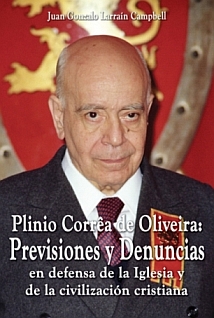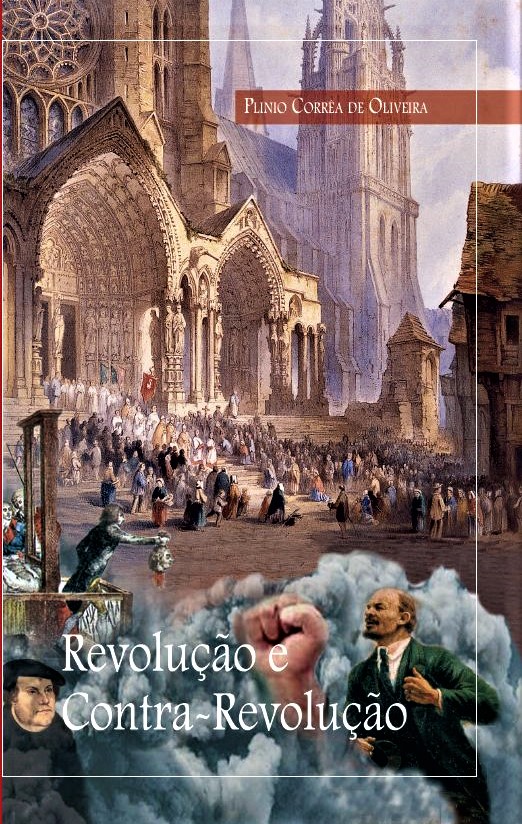|
Juan Gonzalo Larrain Campbell
Revolution and Counter-Revolution: Elevation of Thought, Effectiveness in Action1
Catolicismo, April 1999 |
|
|
Revolution and Counter-Revolution is the axis around which Catolicismo articles have revolved for many decades. However, to give our readers a better idea of the work’s penetration as we celebrate the 50th anniversary of its launching, we want to show the influence and effectiveness of Plinio Corrêa de Oliveira’s thought on the theoretical and practical struggle against the Revolution based on opinions of churchmen, thinkers and writers of various ideological tendencies. 2 Revolution and Counter-Revolution “corresponds to an elaborate and combative doctrine, which inspires the campaigns and offensives of the [TFP] movement since its constitution.” The Ecuadorian Jesuit Fr. Aurelio F. Aulestia shows the grand scope of Revolution and Counter-Revolution, presenting it as a contemporary approach to the combat between Good and Evil that St. Augustine dealt with in The City of God and St. Ignatius Loyola in The Two Standards. “Two cities have been formed by two loves,” writes St. Augustine—“the earthly by the love of self even to the contempt of God; the heavenly, by the love of God even to the contempt of self” (De Civitate Dei XIV:28). “In his Spiritual Exercises, Saint Ignatius Loyola presents the famous meditation on the Two Standards, which is a commentary on St. Augustine’s brilliant vision. “In another way, but essentially coinciding with St. Augustine and St. Ignatius Loyola, an egregious modern thinker and writer, Plinio Corrêa de Oliveira, a Brazilian, presents the eternal struggle between the Two Standards under the names of Revolution and Counter-Revolution.” 3 A Fundamental Essay within Traditionalism The Brazilian writer Ubiratan de Macedo, who acknowledges his ideological disagreement with TFP, affirms that Revolution and Counter-Revolution sets the philosophical foundations of traditionalism: “In 1959...Plinio Corrêa de Oliveira wrote a fundamental essay in traditionalism. We refer to the work Revolution and Counter-Revolution, which was soon translated into several languages, characterizing the worldwide importance of Brazilian traditionalism. “This essay sets the philosophical foundations of traditionalism.” Mr. Macedo goes on to highlight the metaphysical and theological vision of history that emerges from the work: “It characterizes the Revolution as being not only a localized movement like the French Revolution but also gives it a metaphysical and theological dimension in history. The Revolution is a fearsome enemy that inspires a chain of ideologies behind the Protestant Reformation, the French Revolution, and Communism.” 4 The Best Systematization of the Counter-Revolution In turn, the Spanish author Luis M. Sandoval Pinillos writes: “The most complex and systematic approach to the Counter-Revolution... is possibly the one contained in the book by Plinio Corrêa de Oliveira, Revolution and Counter-Revolution, an inescapable reference.” He later adds that the conception of the work is “perfect as an ideal archetype, very useful and necessary to form a compact organization of counter-revolutionary combat.” 5 “It Inspires TFP Campaigns” The French progressive priest Charles Antoine, a well-known Brazilianist,6 clearly shows the author’s hierarchical spirit and the book’s comprehensive nature, recognizing the work’s effectiveness also in the socio-political field, as it inspires TFP campaigns: “Only much later did this theological thinking become oriented and systematized. Indeed, in 1959, Plinio Corrêa de Oliveira published a new book, Revolution and Counter-Revolution. According to the author, the world revolution is underway and necessarily leads to the destruction of man and society...” He continues: “Today, communism is the enemy, and the Counter-Revolution is a Christian’s specific and direct struggle. A monarchist idea inspires Counter-Revolution. That does not imply rejecting the republic, which is not necessarily revolutionary in essence... “Revolution and Counter-Revolution expounds an elaborate and combative doctrine that has inspired the TFP movement’s campaigns and offensives since its founding.” 7 Revolution and Counter-Revolution’s Powerful Influence in Chile According to the leftist sociologist Otto Boye, the influence Revolution and Counter-Revolution exerted in the socio-political sphere in the sixties and eighties profoundly marked the polarization of the Chilean situation. After saying that the Jesuit Father Vekemans led the progressive pole, he writes: “For its part, the TFP solemnized the presence in Chile of a right-wing Catholic mentality that seemed to have practically disappeared. One of its founding fathers [sic], the Brazilian Plinio Corrêa de Oliveira, became widely known in Chile through his work, Revolution and Counter-Revolution. Given the reception this right-wing fundamentalist current has had among some upper-class Catholics who have a powerful influence on the Chilean government to this day, a couple of central reflections by said author deserve to be cited...” 8 Catechism of the Counter-Revolution The words of the well-known American writer John Steinbacher in his preface to the English edition of the work published in the United States in 1972 greatly honor the author: “This book is a counter-revolutionary catechism. History has recorded revolutionary catechisms in the past ... But there never was a book like the one you are going to read...” After making a summary of the work, he concludes: “There is no question but that the last half of this book [the Counter-Revolution] is the most important document ever written, short of the Bible, since it spells out clearly and unequivocally exactly how Christian Civilization can be saved by this generation.” 9 Praise from Most Rev. Mons. Romolo Carboni, Apostolic Nuncio Barely two years after the books’ publication, the then Apostolic Nuncio in Peru, Most Rev. Romolo Carboni,10 sent the author a letter dated July 24, 1961, expressing his “magnificent impression” of the work. Here are a few excerpts: “Illustrious Professor, “The reading of your book, Revolution and Counter-Revolution made a magnificent impression on me because of the courage and mastery with which you analyze the revolutionary process and shed abundant light over the true causes of the crumbling of moral values disorienting consciences today, and equally because of the vigor with which you indicate the tactics and methods to overcome it. “I am certain that your book has rendered an important service to the Catholic cause and that it will gather the forces of good in order to solve this great contemporary problem rapidly... “I wish, illustrious Professor, the widespread diffusion of and a well-merited response to your book by Catholic readers wishing to join the ranks of the counter-revolutionary movement. “Please accept the testimony of my sincere admiration for your work and the expression of my highest consideration.” Romolo Carboni (Titular Archbishop of Sidon), Apostolic Nuncio.” Notes: 1. https://www.tfp.org/revolution-and-counter-revolution/ Revolution and Counter Revolution synthetically expounds the methods and ultimate goals of the agents that promote the Revolution, as well as the internal dynamics they give the revolutionary process. Prof. Plinio Corrêa de Oliveira formulated his forecasts based on his knowledge of these methods, goals and dynamics. That is why we place this article at the end of Part One of this book. This perspective should help to illuminate the reading of its Part Two. 2. The texts presented in this article constitute a small sample of the hundreds of repercussions of Revolution and Counter-Revolution that we have on our hands. 3. Aurelio F. Aulestia B., SJ, ¡Es necesario que Jesucristo reine!, Ed. En la Mitad del Mundo, Quito, 1973, pp. 64, 65. Fr. Aulestia and all authors cited below base their statements on Revolution and Counter-Revolution, transcribing excerpts from the work. Here we limit ourselves to reproduce their opinions. 4. Ubiratan de Macedo, As ideias políticas no Brasil, Convivio, São Paulo, 1979, vol. 2, p. 241. 5. Luis María Sandoval Pinillos, Consideraciones sobre la Contrarrevolución, Speiro, 1990, pp. 3, 28, 29. 6. Fr. Charles Antoine has written numerous books on the political-religious situation in Brazil, in many of which he deals extensively with the thought and action of Plinio Corrêa de Oliveira. 7. Fr. Charles Antoine, O Integrismo Brasileiro, Civilização Brasileira, 1980, pp. 22, 23. 8. “Condicionantes externas del aporte de la Iglesia Católica a la Idea y Praxis de la Democracia en Chile,” CED (Centro de Estudios del Desarrollo), Otto Boye, August 1984, nº 13, pp. 29-31. 9. Revolution and Counter-Revolution, Educator Publications, Fullerton, Calif., 1972, Foreword by John Steinbacher, pp. 7 & 10. 10. Most Rev. Romolo Carboni was Apostolic Nuncio to Peru, and later to Italy’s government |
|


